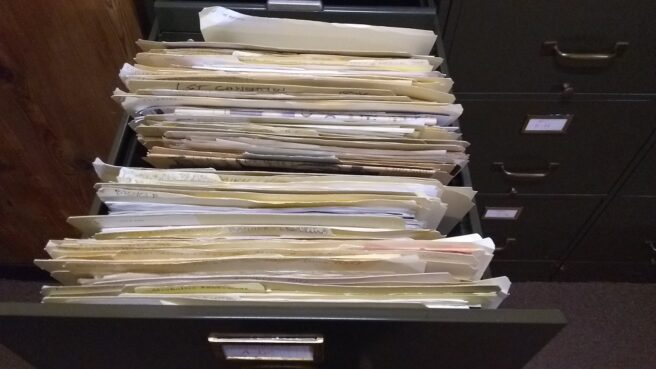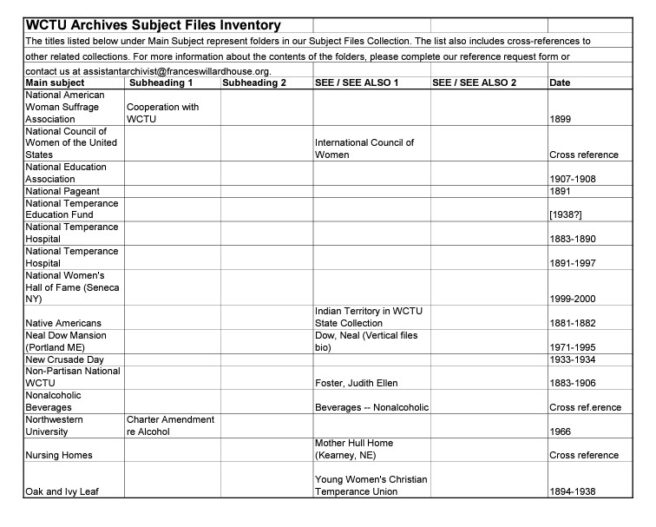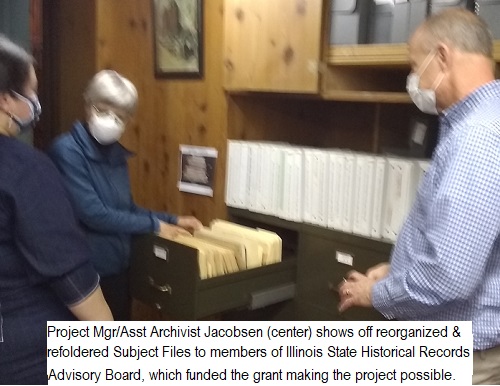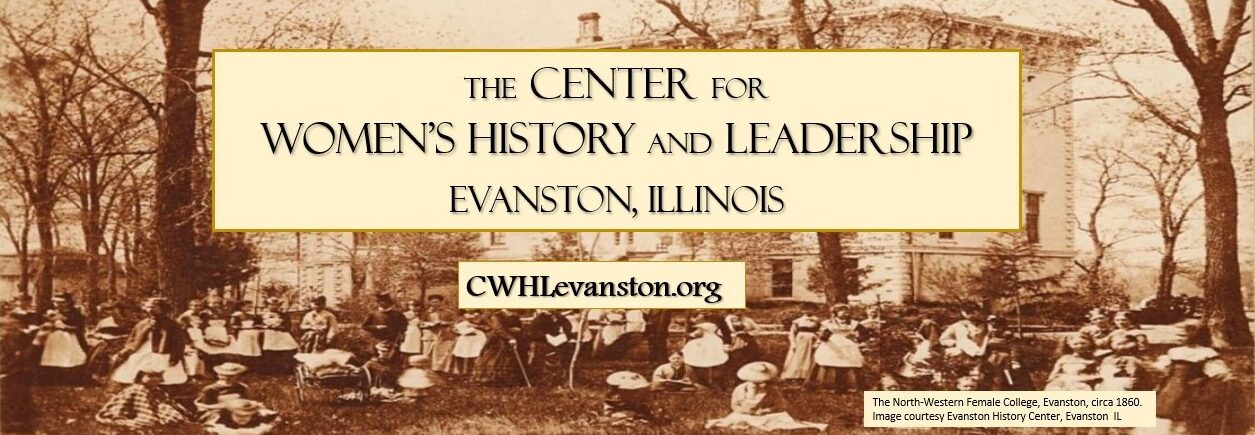By Kristin Jacobsen
Assistant Archivist, Frances Willard House Museum and WCTU Archives
When I heard about the Illinois State Historical Records Advisory Board (ISHRAB), my mind went to Moby Dick. My name is Ishrab? No, no. That’s Ishmael. Captain Ishrab? No, Ahab is the protagonist of Herman Melville’s novel.
ISHRAB, it turns out, is neither sailor, sea captain, nor white whale, but a state agency that awards grants on behalf of the National Historical Publications and Records Commission (NHPRC). The grants are intended for smaller organizations that can’t usually compete for big grants—like us. We applied for a Historical Records Grant, a matching grant with a maximum of $5,000, to increase online access to research materials.
Our white whale was our messy and inaccessible collection of 700+ subject and biographical files. A perfect project for an ISHRAB grant, it would allow us to reorganize and standardize the folders and make an inventory available online. Simple, but for a small archive with part-time archivists, it was a project we could not embark on without help to fund time and supplies. We were glad to be awarded a grant of $1,511, which covered the cost of folders and half the hours needed. We matched it with in-kind hours to cover the additional time required to do the work.
As is the case with most archives, our subject and biographical files are essentially mini collections, built from a combination of primary and secondary material, including documents, correspondence, ephemera, newspaper and magazine clippings, and publications.

The subject files cover topics relating directly or indirectly to WCTU interests (tobacco, Prohibition, woman suffrage, quilts), events (1933 Century of Progress Fair, World War I, parades), and specific organizations or programs (Woman’s Temperance Publishing Co., Scientific Temperance Instruction), to name just a few topics. Biographical files document the lives of well-known and lesser-known WCTU leaders, as well as other people connected to the movements and projects in which the WCTU was involved. The WCTU Archives staff depends on these files and uses them regularly, with some difficulty, but few others know of their existence.
There was also another need for overhauling the files. After many years of haphazard compilation by volunteers, librarians, and archivists, the folders themselves were in poor condition, and uncontrolled file naming had made them difficult to locate, even for on-site use. The grant allowed us to purchase new folders, as well as materials for making repairs, and it paid for the extra time needed to do the work of planning, rehousing, and re-naming the files.
As assistant archivist, I was the project manager, and with the help of student volunteers went through the files to arrange and consolidate documents, remove duplicates and unrelated items, and repair damaged documents. We re-housed the contents in new folders (acid-free! all the same size!) and created a spreadsheet inventory of topics and personal names. Cut to the chase: The grant has been critical for allowing us to increase the visibility and improve the condition of materials in the collection. The list of subject files is now available online, and the list of personal names will follow shortly.

Aside from funding our time and materials, we didn’t realize that other benefits would emerge from the grant. Of course, most important was the goal of getting information about our holdings out to all potential researchers. Although the material within the subject folders is not digitized, and perhaps never will be, the online inventory increases the visibility of our holdings immensely. The inventory is currently in simple PDF form, although we have plans to make it even more easily searchable.
Another important and time-consuming element of the project was the need to create from scratch a new, standardized set of terms to identify the folders. In addition to being an archivist, I am also a librarian and so was familiar with the concept of controlled vocabulary, but I hadn’t had a chance to set something like that up. After researching standard practice and examples from other institutions, we came up with a set of rules that will guide us and future WCTU Archives staff as the collection continues to grow. These rules and the terms that have been chosen so far will have an impact beyond the subject and biographical files, as they are a step the larger goal of establishing a naming and organizing standard for all the collections in the WCTU Archives and the Frances Willard House Museum. This bonus benefit will help our small staff become more efficient, save time, and make all our collections easier to find and use.
Further, we didn’t fully appreciate the critical importance of accountability, i.e., the completion deadline. We had talked many times about the need to redo and provide external access to the subject and biographical files, but something else always came up to push the project to the back burner. Once we’d been awarded the grant, however, we had to finish the project by June 30, 2022. There’s nothing like a deadline to get you moving!

Another unexpected benefit of the project is personal. I now have a better idea of the breadth and depth of the collection, and of the kinds of topics it covers. In most archives, there’s rarely a chance to learn about a collection as thoroughly as I did during this project, so I am thankful I could. Since I am more aware of the topics covered in the subject and biographical files, I’ve been able to make more connections to help researchers.
I’ve also been able to pull out ideas for social media, including recent posts on subjects like dress reform, flower missions, Frances Willard’s Eagle Nest retreat in New York, around-the-world missionaries like Mary Clement Leavitt, and the origins of the WCTU name. Keep an eye out for more posts on Twitter, Facebook, Instagram, and our blog. While I would have learned about these interesting facets of WCTU history over time, the grant project has given me a crash course sooner.
The project has netted us a bountiful catch, both from its expected benefits and for those that have emerged along the way. Thank you, ISHRAB and NHPRC!
